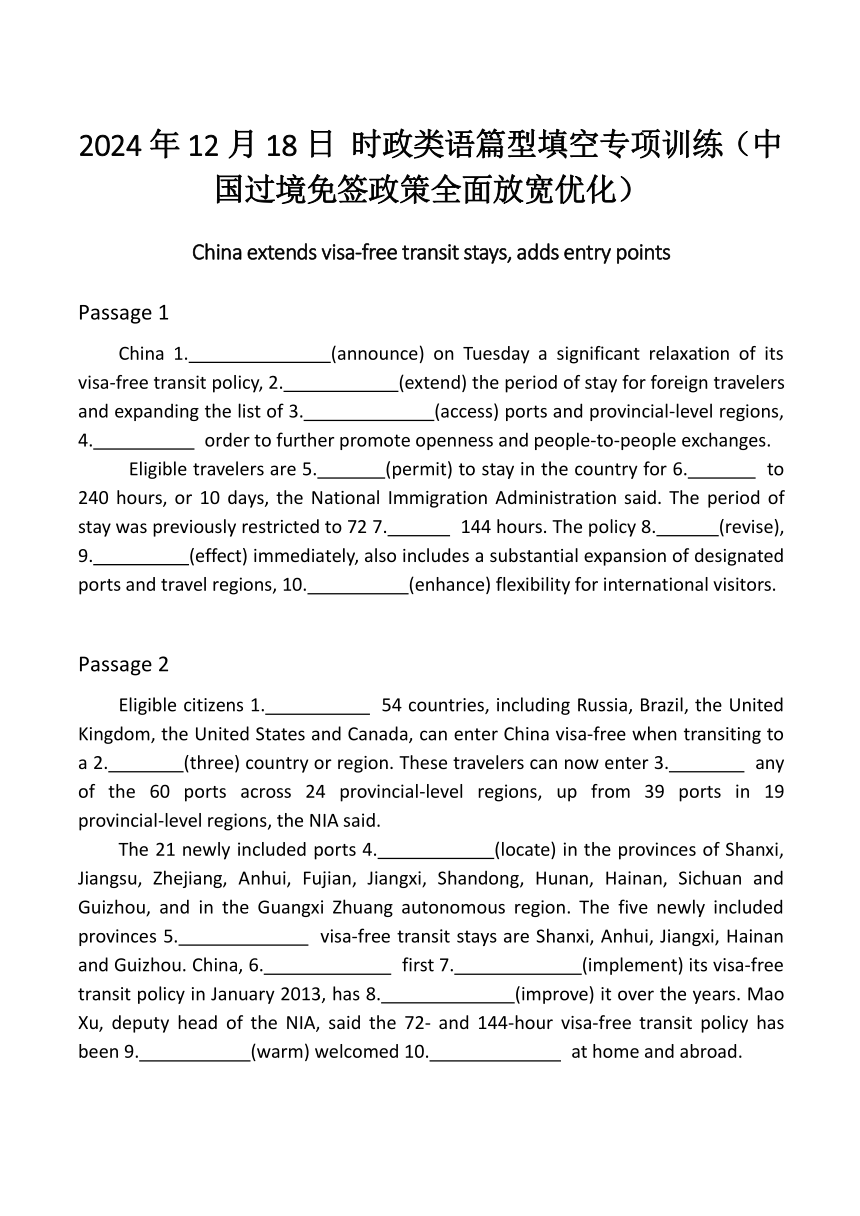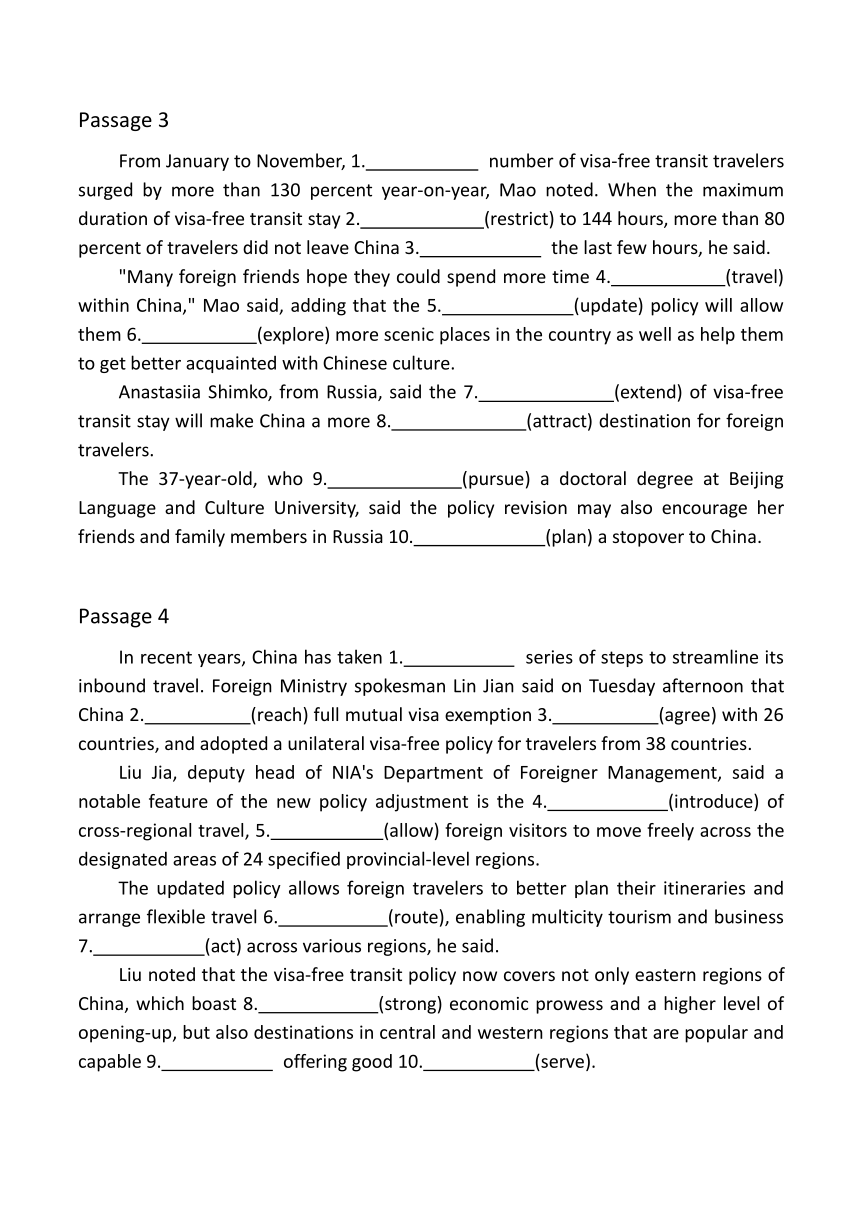2024年12月18日 时政类语篇型填空专项训练(中国过境免签政策全面放宽优化)(4篇,含答案与译文)-2025届高三英语复习专项
文档属性
| 名称 | 2024年12月18日 时政类语篇型填空专项训练(中国过境免签政策全面放宽优化)(4篇,含答案与译文)-2025届高三英语复习专项 |  | |
| 格式 | docx | ||
| 文件大小 | 27.8KB | ||
| 资源类型 | 教案 | ||
| 版本资源 | 人教版(2019) | ||
| 科目 | 英语 | ||
| 更新时间 | 2025-02-11 22:38:25 | ||
图片预览


文档简介
2024年12月18日 时政类语篇型填空专项训练(中国过境免签政策全面放宽优化)
China extends visa-free transit stays, adds entry points
Passage 1
China 1. (announce) on Tuesday a significant relaxation of its visa-free transit policy, 2. (extend) the period of stay for foreign travelers and expanding the list of 3. (access) ports and provincial-level regions, 4. order to further promote openness and people-to-people exchanges.
Eligible travelers are 5. (permit) to stay in the country for 6. to 240 hours, or 10 days, the National Immigration Administration said. The period of stay was previously restricted to 72 7. 144 hours. The policy 8. (revise), 9. (effect) immediately, also includes a substantial expansion of designated ports and travel regions, 10. (enhance) flexibility for international visitors.
Passage 2
Eligible citizens 1. 54 countries, including Russia, Brazil, the United Kingdom, the United States and Canada, can enter China visa-free when transiting to a 2. (three) country or region. These travelers can now enter 3. any of the 60 ports across 24 provincial-level regions, up from 39 ports in 19 provincial-level regions, the NIA said.
The 21 newly included ports 4. (locate) in the provinces of Shanxi, Jiangsu, Zhejiang, Anhui, Fujian, Jiangxi, Shandong, Hunan, Hainan, Sichuan and Guizhou, and in the Guangxi Zhuang autonomous region. The five newly included provinces 5. visa-free transit stays are Shanxi, Anhui, Jiangxi, Hainan and Guizhou. China, 6. first 7. (implement) its visa-free transit policy in January 2013, has 8. (improve) it over the years. Mao Xu, deputy head of the NIA, said the 72- and 144-hour visa-free transit policy has been 9. (warm) welcomed 10. at home and abroad.
Passage 3
From January to November, 1. number of visa-free transit travelers surged by more than 130 percent year-on-year, Mao noted. When the maximum duration of visa-free transit stay 2. (restrict) to 144 hours, more than 80 percent of travelers did not leave China 3. the last few hours, he said.
"Many foreign friends hope they could spend more time 4. (travel) within China," Mao said, adding that the 5. (update) policy will allow them 6. (explore) more scenic places in the country as well as help them to get better acquainted with Chinese culture.
Anastasiia Shimko, from Russia, said the 7. (extend) of visa-free transit stay will make China a more 8. (attract) destination for foreign travelers.
The 37-year-old, who 9. (pursue) a doctoral degree at Beijing Language and Culture University, said the policy revision may also encourage her friends and family members in Russia 10. (plan) a stopover to China.
Passage 4
In recent years, China has taken 1. series of steps to streamline its inbound travel. Foreign Ministry spokesman Lin Jian said on Tuesday afternoon that China 2. (reach) full mutual visa exemption 3. (agree) with 26 countries, and adopted a unilateral visa-free policy for travelers from 38 countries.
Liu Jia, deputy head of NIA's Department of Foreigner Management, said a notable feature of the new policy adjustment is the 4. (introduce) of cross-regional travel, 5. (allow) foreign visitors to move freely across the designated areas of 24 specified provincial-level regions.
The updated policy allows foreign travelers to better plan their itineraries and arrange flexible travel 6. (route), enabling multicity tourism and business 7. (act) across various regions, he said.
Liu noted that the visa-free transit policy now covers not only eastern regions of China, which boast 8. (strong) economic prowess and a higher level of opening-up, but also destinations in central and western regions that are popular and capable 9. offering good 10. (serve).
参考答案
参考答案1
1.announced 2.extending 3.accessible 4.in 5.permitted
6.up 7.or 8.revision 9.effective 10.enhancing
参考译文1
周二,中国宣布大幅放宽过境免签政策,延长外国游客的停留期限,扩大可访问的港口和省级地区名单,以进一步促进开放和人文交流。
国家移民管理局表示,符合条件的游客最多可在中国停留240小时,即10天。停留时间以前限制为72或144小时。修订后的政策立即生效,其中还包括大幅扩大指定港口和旅游区域,提高国际游客的灵活性。
参考答案2
1.from 2.third 3.through 4.are located 5.for
6.which 7.implemented 8.been improving 9.warmly 10.both
参考译文2
来自俄罗斯、巴西、英国、美国、加拿大等54个国家的符合条件的公民,过境前往第三国或地区时,可免签入境。这些旅行者现在可以从24个省级地区的60个港口中的任何一个进入,而不是19个省级地区的39个港口,国家移民管理局表示。
新纳入的21个港口分别位于山西、江苏、浙江、安徽、福建、江西、山东、湖南、海南、四川、贵州以及广西壮族自治区。新加入的过境免签省份是山西、安徽、江西、海南和贵州.中国于2013年1月首次实施过境免签政策,多年来一直在改进这一政策。国家旅游局副局长毛旭表示,72小时和144小时过境免签政策在国内外都受到了热烈欢迎。
参考答案3
1.the 2.was restricted 3.until 4.traveling 5.updated
6.to explore 7.extension 8.attractive 9.is pursuing 10.to plan
参考译文3
毛指出,从1月到11月,免签证过境旅客的数量同比激增130%以上。他说,当免签过境停留的最长时间限制为144小时时,超过80%的旅客直到最后几个小时才离开中国。
“许多外国朋友希望他们能花更多的时间在中国旅行,”毛说,并补充说,最新的政策将允许他们探索中国更多的风景,并帮助他们更好地了解中国文化。
来自俄罗斯的Anastasiia Shimko表示,免签证过境停留的延长将使中国成为对外国游客更具吸引力的目的地。
37岁的她正在北京语言大学攻读博士学位,她说,政策的修订也可能会鼓励她在俄罗斯的朋友和家人计划中途停留到中国。
参考答案4
1.a 2.has reached 3.agreements 4.introduction 5.allowing
6.routes 7.activities 8.stronger 9.of 10.services
参考译文4
近年来,中国采取了一系列措施来简化入境旅游。外交部发言人林坚周二下午表示,中国已与26个国家达成全面互免签证协议,并对38个国家的旅客采取单边免签证政策。
国家旅游局外国人管理部副主任刘佳表示,新政策调整的一个显著特点是引入了跨区域旅行,允许外国游客在24个指定省级地区的指定区域自由移动。
他说,新政策允许外国游客更好地规划行程,安排灵活的旅行路线,实现跨地区的多城市旅游和商业活动。
刘指出,过境免签政策现在不仅覆盖了中国东部地区,这些地区拥有更强大的经济实力和更高的开放水平,而且还覆盖了中西部地区的热门目的地,这些地区能够提供良好的服务。
China extends visa-free transit stays, adds entry points
Passage 1
China 1. (announce) on Tuesday a significant relaxation of its visa-free transit policy, 2. (extend) the period of stay for foreign travelers and expanding the list of 3. (access) ports and provincial-level regions, 4. order to further promote openness and people-to-people exchanges.
Eligible travelers are 5. (permit) to stay in the country for 6. to 240 hours, or 10 days, the National Immigration Administration said. The period of stay was previously restricted to 72 7. 144 hours. The policy 8. (revise), 9. (effect) immediately, also includes a substantial expansion of designated ports and travel regions, 10. (enhance) flexibility for international visitors.
Passage 2
Eligible citizens 1. 54 countries, including Russia, Brazil, the United Kingdom, the United States and Canada, can enter China visa-free when transiting to a 2. (three) country or region. These travelers can now enter 3. any of the 60 ports across 24 provincial-level regions, up from 39 ports in 19 provincial-level regions, the NIA said.
The 21 newly included ports 4. (locate) in the provinces of Shanxi, Jiangsu, Zhejiang, Anhui, Fujian, Jiangxi, Shandong, Hunan, Hainan, Sichuan and Guizhou, and in the Guangxi Zhuang autonomous region. The five newly included provinces 5. visa-free transit stays are Shanxi, Anhui, Jiangxi, Hainan and Guizhou. China, 6. first 7. (implement) its visa-free transit policy in January 2013, has 8. (improve) it over the years. Mao Xu, deputy head of the NIA, said the 72- and 144-hour visa-free transit policy has been 9. (warm) welcomed 10. at home and abroad.
Passage 3
From January to November, 1. number of visa-free transit travelers surged by more than 130 percent year-on-year, Mao noted. When the maximum duration of visa-free transit stay 2. (restrict) to 144 hours, more than 80 percent of travelers did not leave China 3. the last few hours, he said.
"Many foreign friends hope they could spend more time 4. (travel) within China," Mao said, adding that the 5. (update) policy will allow them 6. (explore) more scenic places in the country as well as help them to get better acquainted with Chinese culture.
Anastasiia Shimko, from Russia, said the 7. (extend) of visa-free transit stay will make China a more 8. (attract) destination for foreign travelers.
The 37-year-old, who 9. (pursue) a doctoral degree at Beijing Language and Culture University, said the policy revision may also encourage her friends and family members in Russia 10. (plan) a stopover to China.
Passage 4
In recent years, China has taken 1. series of steps to streamline its inbound travel. Foreign Ministry spokesman Lin Jian said on Tuesday afternoon that China 2. (reach) full mutual visa exemption 3. (agree) with 26 countries, and adopted a unilateral visa-free policy for travelers from 38 countries.
Liu Jia, deputy head of NIA's Department of Foreigner Management, said a notable feature of the new policy adjustment is the 4. (introduce) of cross-regional travel, 5. (allow) foreign visitors to move freely across the designated areas of 24 specified provincial-level regions.
The updated policy allows foreign travelers to better plan their itineraries and arrange flexible travel 6. (route), enabling multicity tourism and business 7. (act) across various regions, he said.
Liu noted that the visa-free transit policy now covers not only eastern regions of China, which boast 8. (strong) economic prowess and a higher level of opening-up, but also destinations in central and western regions that are popular and capable 9. offering good 10. (serve).
参考答案
参考答案1
1.announced 2.extending 3.accessible 4.in 5.permitted
6.up 7.or 8.revision 9.effective 10.enhancing
参考译文1
周二,中国宣布大幅放宽过境免签政策,延长外国游客的停留期限,扩大可访问的港口和省级地区名单,以进一步促进开放和人文交流。
国家移民管理局表示,符合条件的游客最多可在中国停留240小时,即10天。停留时间以前限制为72或144小时。修订后的政策立即生效,其中还包括大幅扩大指定港口和旅游区域,提高国际游客的灵活性。
参考答案2
1.from 2.third 3.through 4.are located 5.for
6.which 7.implemented 8.been improving 9.warmly 10.both
参考译文2
来自俄罗斯、巴西、英国、美国、加拿大等54个国家的符合条件的公民,过境前往第三国或地区时,可免签入境。这些旅行者现在可以从24个省级地区的60个港口中的任何一个进入,而不是19个省级地区的39个港口,国家移民管理局表示。
新纳入的21个港口分别位于山西、江苏、浙江、安徽、福建、江西、山东、湖南、海南、四川、贵州以及广西壮族自治区。新加入的过境免签省份是山西、安徽、江西、海南和贵州.中国于2013年1月首次实施过境免签政策,多年来一直在改进这一政策。国家旅游局副局长毛旭表示,72小时和144小时过境免签政策在国内外都受到了热烈欢迎。
参考答案3
1.the 2.was restricted 3.until 4.traveling 5.updated
6.to explore 7.extension 8.attractive 9.is pursuing 10.to plan
参考译文3
毛指出,从1月到11月,免签证过境旅客的数量同比激增130%以上。他说,当免签过境停留的最长时间限制为144小时时,超过80%的旅客直到最后几个小时才离开中国。
“许多外国朋友希望他们能花更多的时间在中国旅行,”毛说,并补充说,最新的政策将允许他们探索中国更多的风景,并帮助他们更好地了解中国文化。
来自俄罗斯的Anastasiia Shimko表示,免签证过境停留的延长将使中国成为对外国游客更具吸引力的目的地。
37岁的她正在北京语言大学攻读博士学位,她说,政策的修订也可能会鼓励她在俄罗斯的朋友和家人计划中途停留到中国。
参考答案4
1.a 2.has reached 3.agreements 4.introduction 5.allowing
6.routes 7.activities 8.stronger 9.of 10.services
参考译文4
近年来,中国采取了一系列措施来简化入境旅游。外交部发言人林坚周二下午表示,中国已与26个国家达成全面互免签证协议,并对38个国家的旅客采取单边免签证政策。
国家旅游局外国人管理部副主任刘佳表示,新政策调整的一个显著特点是引入了跨区域旅行,允许外国游客在24个指定省级地区的指定区域自由移动。
他说,新政策允许外国游客更好地规划行程,安排灵活的旅行路线,实现跨地区的多城市旅游和商业活动。
刘指出,过境免签政策现在不仅覆盖了中国东部地区,这些地区拥有更强大的经济实力和更高的开放水平,而且还覆盖了中西部地区的热门目的地,这些地区能够提供良好的服务。
